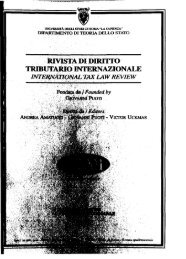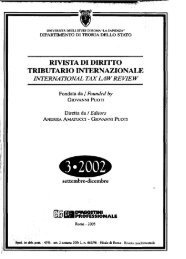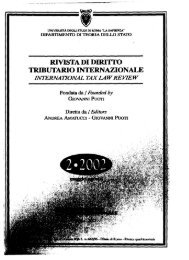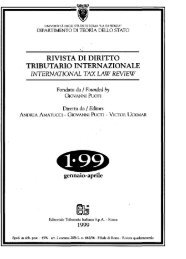RIVISTA DI DIRITTO TRIBUTARIO INTERNAZIONALE - Rdti.it
RIVISTA DI DIRITTO TRIBUTARIO INTERNAZIONALE - Rdti.it
RIVISTA DI DIRITTO TRIBUTARIO INTERNAZIONALE - Rdti.it
Create successful ePaper yourself
Turn your PDF publications into a flip-book with our unique Google optimized e-Paper software.
M. Leo: The so-called "tonnage tax" - Possibili(v or ù1troduction imo Iral)'<br />
typical incomes components, which the law has specifically chosen to<br />
configurate as an alternative system of determination of the taxable base.<br />
Another presumptive taxation mechanism is the one foreseen by Law<br />
662/96 for small business enterprises, which do not exceed certain business<br />
turnover levels. In these cases incomes are deterrnined presumptively<br />
by applying coefficients to the total amount of gross proceeds.<br />
Hence the cases in whieh the presumptive deterrnination of incorne<br />
is possible under Ilalian tax law are today very circumscribed. However,<br />
should our legislators consider <strong>it</strong> opportune to introduce a mechanism of<br />
tlris type also w<strong>it</strong>h regard to the income taxation of shipping com pani es,<br />
the mechanism applied would be perfectly analogous to the one already<br />
employed in other cases (real estate and small businesses).<br />
Presumptively detennined incorne rnechanisrn - application problerns<br />
Having expressed this preference, we now come to the further problems<br />
that would appear on the horizon at the ti me of an actual decision<br />
to introduce into our tax system a new case of presumptive deterrnination<br />
of incomes.<br />
In the first piace, let us examine which are the components that contribute<br />
to the formation of the taxable base, and ask ourselves whether,<br />
apart from the tonnage tax mechanism, there exist other components that<br />
should be included. The problem of cap<strong>it</strong>ai gains has already been mentioned.<br />
In other countries, cap<strong>it</strong>ai gains are included in the presumptive<br />
incomes determination method. Is this possible in Ilaly? Experience<br />
teaches us that in our courtry cap<strong>it</strong>ai gains have always been kept outside<br />
the mechanism for determining presumptive incomes. Here we need<br />
only recall the presumptive-incomes systems designed for small businesses.<br />
Moreover, cap<strong>it</strong>aI gains are extraordinary economie cornponents<br />
not pertaining to ordinary management and, as such, must contribute to<br />
the formation of the taxable base in an analytical manner. Accordingly,<br />
in my opinion, even if a mechanism of this type \Vere to be introduced,<br />
any cap<strong>it</strong>ai gains on the assets relative to shipping enterprises (and naval<br />
vessels in particular) should be subject to taxation in the ordinary manners<br />
in accordance w<strong>it</strong>h the rules foreseen in Art. 54 of Income Tax Consolidation<br />
Law No. 917/86.<br />
In Italy - in contrast w<strong>it</strong>h what occurs in Greece - a mechanism of<br />
this type cannot be introduced on an obligatory basi s, but only as an option<br />
in relation to the ordinary system of analytical taxation of incomes,<br />
because otherwise il would be contraI]' to the const<strong>it</strong>utional principle of<br />
<strong>RIVISTA</strong> <strong>DI</strong> <strong>DI</strong>RITTO TRIBCTARIO INfERNAZIONALE 3/2001






